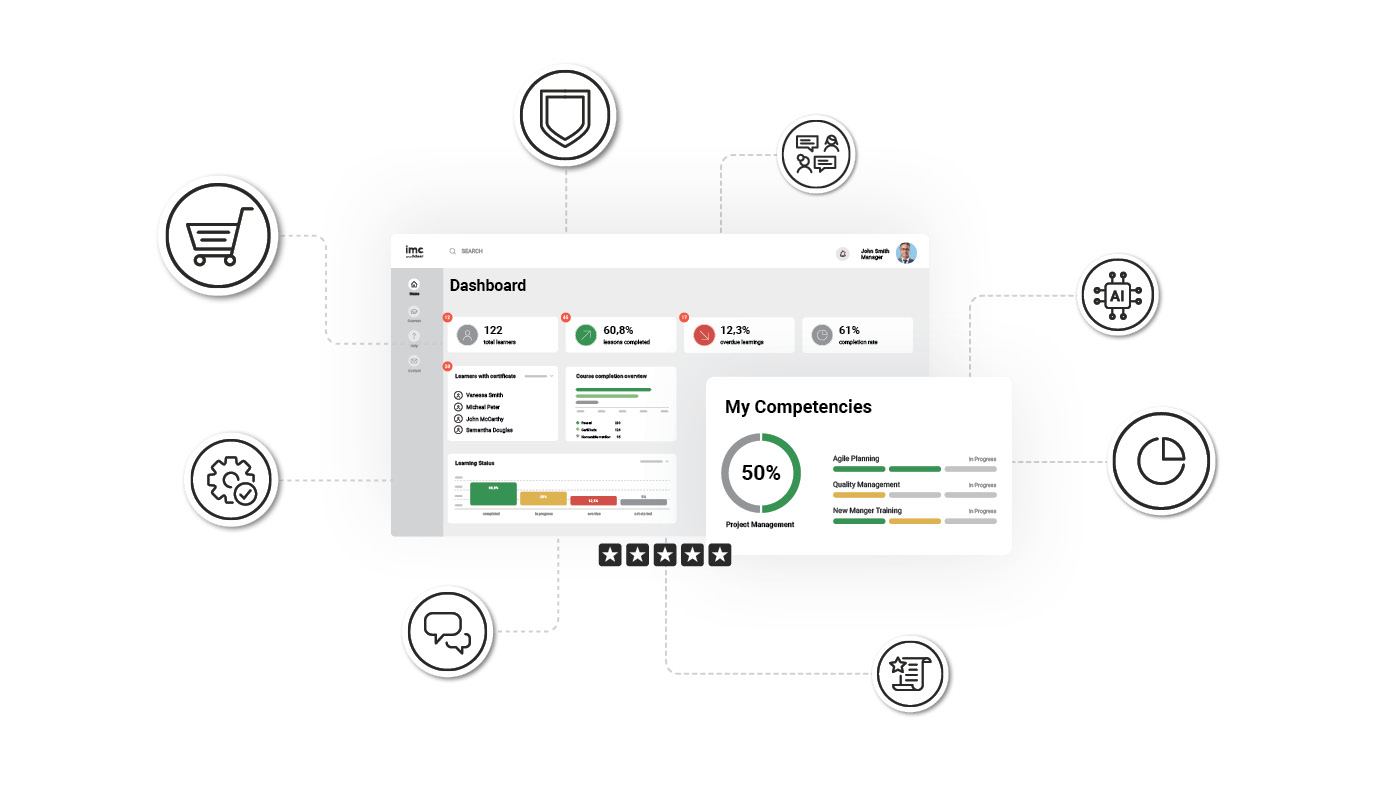Enhancing learning management with LMS integrations

Streamline enterprise learning with essential LMS integrations
A robust learning management system (LMS) is essential for organisations to provide effective training and development opportunities. However, a standalone LMS may not suffice when it comes to meeting diverse learning needs. This is where LMS integrations come into play. Integrating your LMS with other enterprise tools can enhance the functionality, improve user experience, and streamline processes.
The imc Learning Suite offers a powerful suite of integrations and connectors that can seamlessly connect your LMS with various systems and tools to create a cohesive and efficient learning environment. Find out more how you can switch to a modern training landscape by downloading our LMS Upgrade Guide:
What are LMS integrations and why do they matter?
LMS integrations involve connecting your learning management system with other software applications and tools used within your organisation. These integrations ensure data consistency, streamline workflows, enhance user engagement, and provide a more comprehensive learning ecosystem. For instance, integrating your LMS with Human Resource management systems (HRMS), customer relationship management (CRM) software, or communication tools can significantly boost efficiency by automating processes and reducing manual effort.
Integrations also play a critical role in delivering personalised learning experiences. By pulling in data from various sources, an integrated LMS can better understand user behaviour and provide tailored learning paths, content recommendations, and more.

Key LMS integrations available in the imc Learning Suite
The imc Learning Suite is designed to be a flexible and adaptable learning platform that easily integrates with various enterprise applications, ensuring a seamless and enhanced learning experience. Here are some key integrations offered by imc Learning Suite:
1. HR and enterprise resource planning (ERP) systems integration
Seamlessly integrates with popular HR and ERP systems, such as SAP, Workday, and Oracle, allowing for automatic synchronisation of user data, learning history, and organizational structures. This integration ensures that learning management processes align with HR workflows, enabling smooth onboarding, upskilling, and compliance training.
2. Customer relationship management (CRM) systems integration
Integrating with CRM tools like Salesforce allows organizations to deliver targeted training to sales teams, partners, or customers. The integration enables the tracking of learning activities and outcomes, which can help in understanding how training impacts sales performance or customer satisfaction.
3. Content libraries and elearning providers
The IMC Learning Suite supports integration with various elearning content providers such as LinkedIn Learning and Coursera. This allows organizations to expand their course offerings without the need to develop content from scratch. It also ensures that all content, whether internally created or sourced externally, is accessible in a single platform.
4. Communication and collaboration tools
- Integrating with tools like Microsoft Teams, Slack, or Zoom ensures that learning is a part of the daily workflow. Learners can access courses, join virtual classrooms, or engage in social learning directly through these platforms, making learning more interactive and engaging.
5. Identity and access management (IAM) systems
The imc Learning Suite integrates with Single Sign-On (SSO) providers such as Okta and Azure Active Directory. This integration simplifies user management by allowing learners to access the LMS with their existing credentials, improving security and user experience.
6. API and custom integrations
The imc Learning Suite provides open APIs that allow organisations to create custom integrations based on their unique requirements. Whether it's integrating with proprietary systems or building a specific workflow, the flexibility of open APIs ensures that the LMS can adapt to evolving business needs.
7. E-commerce and payment gateway
For organisations offering paid courses, integrating with e-commerce and payment systems like Stripe or PayPal is crucial. This integration enables automated enrolment and payment processing, making the experience smooth for both administrators and learners.
8. Analytics and business intelligence tools
Integrations with analytics and BI tools such as Power BI or Tableau enable advanced reporting and data visualization. Organizations can leverage these integrations to gain insights into learning outcomes, user engagement, and ROI, supporting data-driven decision-making.
Real success stories
Benefits of integrating your LMS with other systems
Integrating an LMS like the imc Learning Suite with other enterprise systems can yield numerous benefits:
- Improved efficiency: By automating processes like user enrolment, data synchronisation, and course assignments, organisations can save time and reduce administrative overhead.
- Enhanced user experience: Integrations provide a seamless user experience by reducing the need for multiple logins and making learning accessible from within the tools that employees use daily
- Data-driven learning: Integrated systems provide richer data sets, allowing for more detailed analysis of learning behaviours and outcomes. This, in turn, facilitates more personalized and impactful learning experiences.
- Scalability and flexibility: Organisations can scale their learning programs more efficiently by leveraging existing tools and systems. As business needs evolve, new integrations can be added without significant changes to the LMS.
- Cost-effective training solutions: By utilising existing tools and platforms, organiaations can reduce the cost of training and development without compromising on quality.
How to leverage LMS integrations effectively
- Identify business needs: Start by identifying which systems and tools are critical for your organization’s learning and development strategy. Prioritize integrations that align with your learning goals.
- Plan for scalability: Choose integrations that not only meet current needs but can also scale as your organization grows. Open APIs and customizable connectors are essential for future-proofing your LMS.
- Ensure data security and compliance: When integrating various systems, ensure that all data transfers are secure and comply with relevant regulations such as GDPR.
- Test integrations thoroughly: Before full implementation, conduct thorough testing to ensure that the integrations work seamlessly and do not disrupt existing workflows.
- Continuous monitoring and optimisation: Regularly monitor the performance of integrations and make adjustments as necessary. Gathering feedback from users can provide insights into how well the integrated systems are working and where improvements are needed.
Take the next step with an integrated LMS
LMS integrations are no longer a luxury; they are a necessity for organizations looking to build a robust and flexible learning ecosystem. The imc Learning Suite offers a comprehensive range of integrations that cater to diverse business needs, from HR and CRM systems to content providers and collaboration tools. By leveraging these integrations, organizations can enhance the learning experience, drive engagement, and achieve their strategic learning and development goals.
If you're looking to elevate your learning management capabilities through effective integrations, the imc Learning Suite provides the flexibility, security, and scalability needed to succeed. Reach out to imc today to explore how these integrations can be tailored to fit your organization’s unique requirements.
If you want to learn more about switching to a new LMS, download our free LMS Upgrade Guide. Get your free copy of The LMS Upgrade Guide here:

